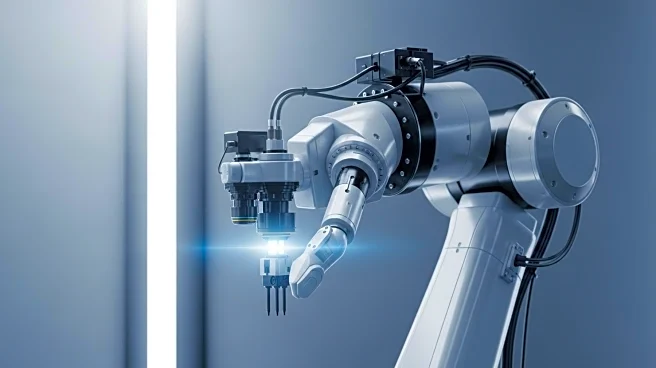What's Happening?
RealSense, previously a part of Intel, has become an independent company, focusing on 'Physical AI' to enhance machine vision beyond human capabilities. Mike Nielsen, the Chief Marketing Officer, is leading the transition, emphasizing the importance of advanced perception systems in robotics and automation. RealSense aims to improve depth camera technology, enabling robots to navigate complex environments with precision. The company is leveraging its independence to accelerate product development and expand industry partnerships, aiming to capture new markets in robotics and biometrics.
Why It's Important?
The spin-out of RealSense from Intel marks a significant shift in the robotics and AI industry, as it allows the company to innovate more freely and respond to market demands swiftly. Enhanced machine vision is crucial for the development of autonomous systems, which are increasingly used in various sectors such as logistics, manufacturing, and personal assistance. RealSense's focus on improving perception technology could lead to more efficient and safer robots, potentially reducing costs and increasing adoption rates. This development is likely to impact the competitive landscape, with RealSense positioning itself as a leader in advanced AI-driven perception systems.
What's Next?
RealSense plans to continue innovating in depth camera technology, with upcoming releases expected to offer improved processing capabilities and modular designs. The company is working towards higher safety certifications and exploring sensor fusion to reduce reliance on expensive lidar systems. As RealSense expands its product offerings, it aims to strengthen its market presence in humanoid robots and autonomous mobile robots (AMRs), potentially leading to increased adoption in dynamic environments. The company is also focusing on privacy-first biometric solutions, aligning with regulatory standards in the U.S. and Europe.
Beyond the Headlines
RealSense's emphasis on privacy in biometric applications highlights the growing importance of ethical considerations in AI development. By ensuring that biometric data is processed on-device without storing personal information, RealSense addresses privacy concerns that are increasingly relevant in today's digital landscape. This approach not only complies with stringent regulations but also builds trust with consumers and businesses, potentially accelerating the adoption of AI technologies in sensitive areas such as security and access control.









